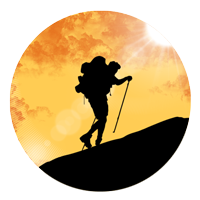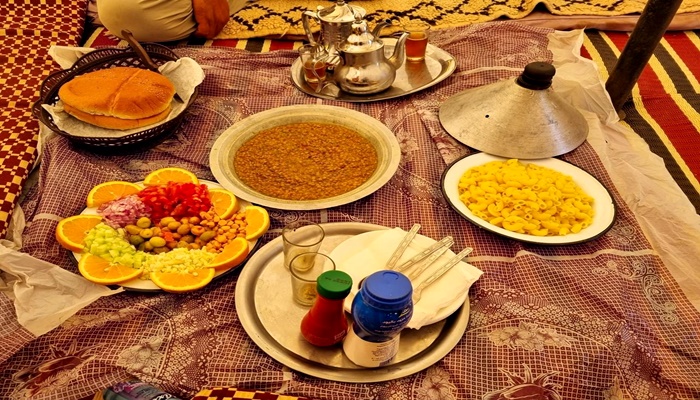Practical info Morocco trekking :
Passport: There is no visa requirement for Morocco. You must have a valid passport (mandatory).
Currency: The Dirham is the local currency. 1 Euro is approximately 11 DH. You can exchange money upon your arrival at the airport or at exchange offices in the city center. Payment for your stay is in Euros and due upon arrival.
Insurance: Please check the conditions of your personal insurance with your company and don’t forget to bring a copy of your insurance documents.
Recommended Equipment: Sleeping bag, a large bag for your clothes (to be transported by mule/camel), a small day backpack, hiking shoes, sandals for the evenings, fleece, personal medications, a water bottle (1 liter or 2 liters), water purification tablets, sunscreen, a pair of sunglasses, a hat, a camera, a headlamp, spare batteries, and a toiletry kit.
Equipment Provided during your trek in Morocco: Collective kitchen equipment, with which our chef will prepare delicious local dishes for you. Plates, cutlery, and bowls for all meals.
Food: During the trek, meals are prepared by a chef. We do our best to provide you with varied, balanced, and authentic Moroccan cuisine.
Breakfast: Bread, jam, honey, milk, black tea, mint tea, instant coffee, hot chocolate, and cheese (like Kiri).
Lunch: A variety of cooked salads or vegetable ratatouille, cooked pasta, seasonal fruit, and mint tea.
Dinner: Moroccan soup, hot tajine or couscous, or a pasta dish, followed by dessert and mint tea.
Dessert and some snacks: Crepes, beignets, cinnamon oranges. Dried fruits are provided daily during the trek.
Tips: At the end of the trip, it is customary to show your satisfaction by giving tips to the muleteers, chef, and guide who accompanied you during your journey. We recommend an average of 10% of the trip price. Tips are not mandatory, not expected, and should never be seen as a salary.
Some Advice: During the trip, it is strongly discouraged to offer candies and pens to children in villages. This habit encourages begging.
To respect local customs and traditions, it is appreciated to wear long pants and long sleeves, especially when passing through a village. For Moroccans, t-shirts are considered underwear, so it is best to wear shirts and avoid revealing clothing.
In public, couples do not touch. For a man and a woman, kissing in public is considered no good , even if married.
We kindly ask you not to take photographs of people without their consent.
Mobile & WhatsApp: 00 212 673 653 077
Email: kherouach.mohamed@gmail.com


